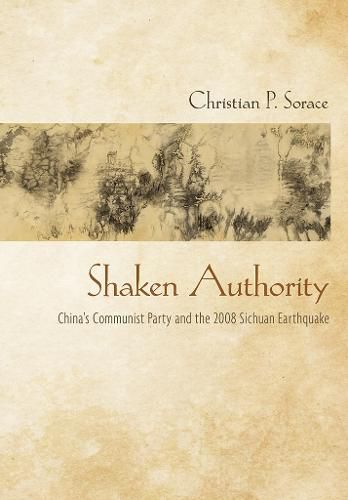Readings Newsletter
Become a Readings Member to make your shopping experience even easier.
Sign in or sign up for free!
You’re not far away from qualifying for FREE standard shipping within Australia
You’ve qualified for FREE standard shipping within Australia
The cart is loading…






In Shaken Authority, Christian P. Sorace examines the political mechanisms at work in the aftermath of the 2008 Sichuan earthquake and the broader ideological energies that drove them. Sorace takes Communist Party ideas and discourse as central to how that organization formulates policies, defines legitimacy, and exerts its power. Sorace argues that the Communist Party has never abandoned its conviction that discourse can shape the world and the people who inhabit it. Sorace also demonstrates how the Communist Party’s planning apparatus continues to play a crucial role in engineering China’s economy and market construction, especially in the countryside. Sorace takes a distinctive and original interpretive approach to understanding Chinese politics, and Shaken Authority demonstrates how Communist Party discourse and ideology influenced the official decisions and responses to the Sichuan earthquake. Sorace provides a clear view of the lived outcomes of Communist Party plans, rationalities, and discourses in the earthquake zone. The three case studies he presents each demonstrate a different type of reconstruction and model of development: urban-rural integration, tourism, and ecological civilization. Sorace’s work emphasizes the need for a grounded literacy in the political concepts, discourses, and vocabularies of the Communist Party itself. To dismiss China’s official discourse as empty propaganda, Sorace argues, makes China and Chinese realities harder to understand, not easier.
$9.00 standard shipping within Australia
FREE standard shipping within Australia for orders over $100.00
Express & International shipping calculated at checkout
In Shaken Authority, Christian P. Sorace examines the political mechanisms at work in the aftermath of the 2008 Sichuan earthquake and the broader ideological energies that drove them. Sorace takes Communist Party ideas and discourse as central to how that organization formulates policies, defines legitimacy, and exerts its power. Sorace argues that the Communist Party has never abandoned its conviction that discourse can shape the world and the people who inhabit it. Sorace also demonstrates how the Communist Party’s planning apparatus continues to play a crucial role in engineering China’s economy and market construction, especially in the countryside. Sorace takes a distinctive and original interpretive approach to understanding Chinese politics, and Shaken Authority demonstrates how Communist Party discourse and ideology influenced the official decisions and responses to the Sichuan earthquake. Sorace provides a clear view of the lived outcomes of Communist Party plans, rationalities, and discourses in the earthquake zone. The three case studies he presents each demonstrate a different type of reconstruction and model of development: urban-rural integration, tourism, and ecological civilization. Sorace’s work emphasizes the need for a grounded literacy in the political concepts, discourses, and vocabularies of the Communist Party itself. To dismiss China’s official discourse as empty propaganda, Sorace argues, makes China and Chinese realities harder to understand, not easier.